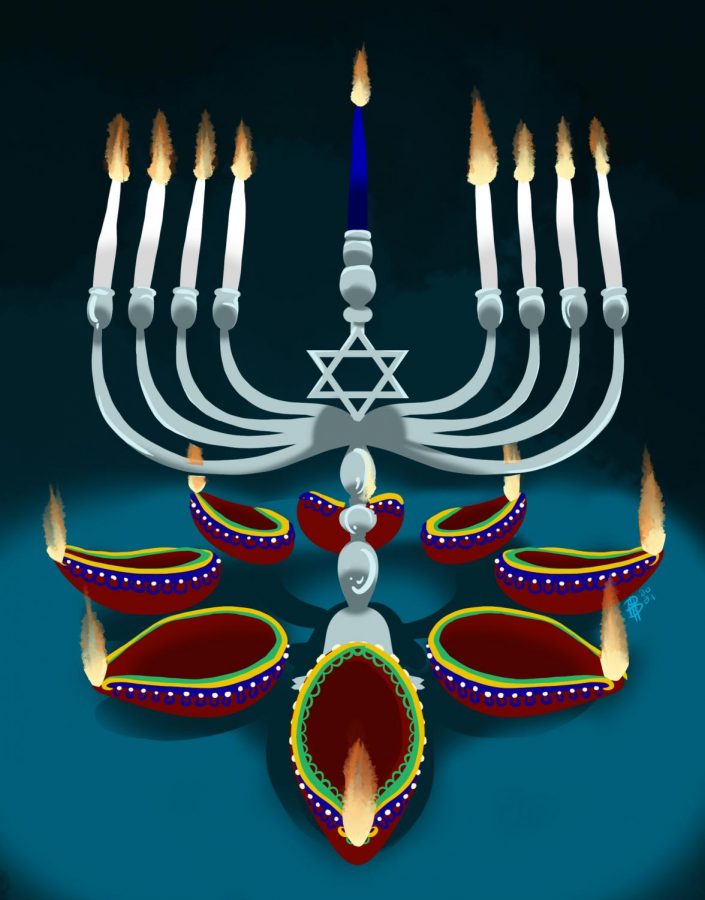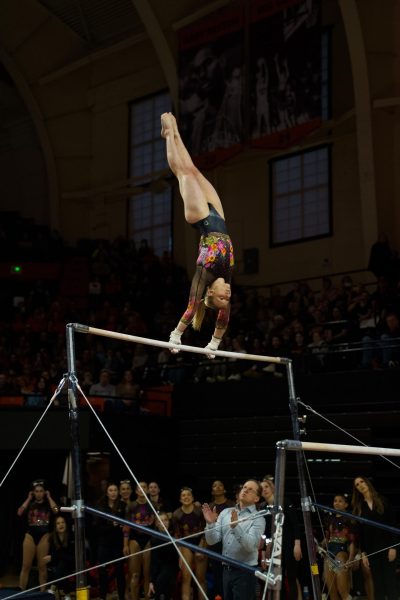Hanukkah and Diwali: Festivals of light in Northern Hemisphere’s darkest season
This illustration shows the Diwali diya and a Hanukkah menorah lit to celebrate the holiday season. Diwali begins on Nov. 4 and is celebrated for five days, and Hanukkah occurs from Nov. 28 to Dec. 6.
November 1, 2021
Hanukkah and Diwali provide respective opportunities for Jewish and Indian students at Oregon State University to build community and tradition.
Hanukkah is a Jewish holiday, often called the Festival of Lights, celebrated annually for eight days beginning on the 25th of Chislev, a month in the Jewish lunisolar calendar. Because the lunisolar calendar is shorter than the more widely-used Gregorian calendar, Hanukkah celebrations may fall on various different dates within late November and December.
In 2021, the 25 of Chislev is on Nov. 28, and Hanukkah celebrations will last until Dec. 6.
Rij Dorfman, student programming director at Oregon Hillel—a Jewish student and community organization—and a second-year electrical engineering major at OSU, described his plans and experiences celebrating Hanukkah both on and off campus.
Dorfman said Hanukkah celebrations at home are an intimate family gathering including traditions of prayer, lighting the Hanukkiah—the Hanukkah menorah—songs and food such as latkes—which are typically potato pancakes—and sufganiyot, a round jelly doughnut. Family gatherings also include gifts and dreidel games, among other activities.
The 2020-21 academic year saw COVID-19 restrictions that limited Oregon Hillel’s ability to celebrate Hanukkah on the OSU campus, but Dorfman said there are various campus activities being planned for Hanukkah in 2021 such as a dreidel tournament and a group lighting of the Hanukkiah.
Another Festival of Lights, Diwali, occurs within the months of October and November, originating in India.
Diwali is a festival celebrated for five days in various religions, including Hinduism, Jainism, Sikhism and Buddhism, on the new moon in autumn. On the Gregorian calendar, the festival begins on Nov. 4 this year.
Akhila Reddy, a Ph.D. student in civil engineering at OSU, explained the festival celebrates the triumph of good over evil and light over darkness after the victory of Lord Rama over King Ravana’s evil army, a story that comes from the Hindu epic Ramayana.
Reddy said celebrations include fireworks, prayer, wearing new clothes and lighting diyas, or oil lamps, around the house. Traditional practices can include cleaning the house to attract prosperity, decorating with mango leaves and flowers and holding a puja—a worship ritual—with a priest to pray to God, though Diwali celebrations look different for every person.
Reddy described her personal experience celebrating Diwali in India.
“[In India] we gather at my grandpa and grandma’s place, and then that is one time of the year we definitely meet,” Reddy said. “So, that is why [Diwali] is important for me… After moving here, I am not really meeting them, but I do call them and I speak with everyone.”
Reddy added the significance of the holiday is similar for many Indian students and workers away from home.
“Festivals are the only way and reason to get back to their [family], and celebrate and get to know their roots and culture,” Reddy said.
Reddy explained her experience with Diwali celebrations on campus as well.
“I see [Diwali] as an opportunity to dress up in Indian clothes… and meet everyone,” Reddy said. “Being graduate and undergraduate students, I think we don’t really have time for each other… But, these kinds of events, they give [students] a chance to catch up with some old friends who [have] not [been] in touch for a long time.”
The Indian Students Association at OSU hosts Diwali Night and cooks Indian food such as rice and curry for about 250 students. The ISA will not be hosting the event during Diwali in 2021, however, due to COVID-19 concerns.
“Most people show up for food. I guess that is one major thing that connects people,” Reddy said.
Dorfman said Jewish celebrations on campus are essential to building community and discovering new traditions. He said the Jewish community has been ostracized throughout history, and emphasized the importance of finding others who practice the customs and traditions.
“You only get as much as you put in,” Dorfman said.
Yiftach (Kevin) Osterloh, assistant professor of history and religious studies at OSU, recounted Hanukkah’s complex origin story.
The Jews of Judea had been ruled by religiously-tolerant Hellenistic—of Greek origin—rulers for over a century, but the Seleucid Empire began to forcibly convert Jewish populations in Judea to the Hellenistic culture.
The Seleucids outlawed the practice of Judaism, seized the Temple of Jerusalem, imposed Greek polytheistic religious practices and killed Jews who disobeyed.
In response, Judah Maccabee of the Hasmonean family used guerilla warfare to defeat the Seleucid forces and, on the 25 of Chislev, 164 BCE, rededicated the Temple of Jerusalem to ancestral practices.
“That’s how it begins. It’s a holiday of national and religious liberation,” Osterloh said.
But the story doesn’t end there; the rule of the Maccabees after the defeat of the Seleucid Empire proved to be controversial.
“[The Maccabees] became rulers and rulers want taxes [and] they want to build their palaces,” Osterloh said. “This might anger locals even though they are their fellow Jews. So, in the Jewish tradition, [the Maccabees] have a checkered history as a result.”
Furthermore, the Roman rule of Judea in 63 BCE prompted the later Great Revolt of the Jewish people. The revolt, however, was not successful, and the Temple of Jerusalem was once again lost to foreign forces.
Osterloh explained the subsequent reinterpretation of Hanukkah by the Rabbis of the Talmud.
“For that two-part reason, because militancy was not helpful after the [Great Revolt]…and, secondly, because the Maccabees had such a negative reputation as rulers… they reinterpreted [Hanukkah] in a manner that for the most part leaves the Maccabees out of the story,” Osterloh said. “What the Rabbis do is totally remove the human element entirely from the story as much as they can, and say ‘no, what really happened was God was involved in saving us again.’”
The Rabbis passed down the story of the search for kosher—what fits with Jewish dietary guidelines—oil to light the eternal flame after the rededication of the Temple of Jerusalem. Only a small amount of oil was inside the Temple, sufficient for only one day. However, when the Jews returned from an eight-day search for more, the eternal flame was still burning. This is the miracle of Hanukkah.
“You see, that brings God back into the story and leaves the Maccabees out,” Osterloh explained. “Holidays that are so old only continue to exist because they are interpreted and reinterpreted over time… They survive because they are reinvented in a way that speaks to each new generation.”
In this way, Osterloh noted how Hanukkah has adopted several meanings and interpretations, specifically as the Holiday of Lights, bringing hope in the darkest season of the year in the Northern Hemisphere. It has also been reinterpreted for childrens’ expectations with gifts and games.
“So, it has a lovely, malleable capacity for reinterpretation within it,” Osterloh said. “Tradition is a live wire… It’s going on all the time.”
























































































































